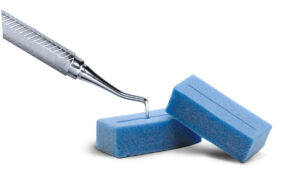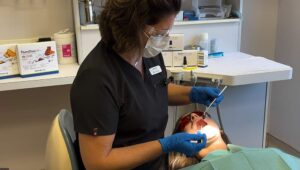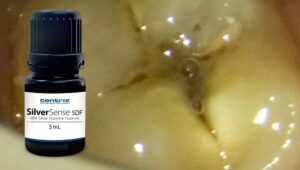Senior Patients Face Many Risks – Help Them Keep a Healthy Smile in Their Golden Years

As we age, our bodies and lifestyles change. Seniors face reduced physical ability, which makes it more difficult for them to manipulate toothbrushes and properly brush their teeth. Lower mobility also increases the likelihood of skipping regular hygiene visits, which are crucial to maintaining good oral health. These factors combined with increased rates of debilitating diseases such as Alzheimer’s and diabetes, are a recipe for dental problems.
Amy Porto, RDH, CDA discusses oral health care for seniors:
ADA offers key points to consider1:
- The demographic of older adults (i.e., 65 years of age and older) is growing and likely will be an increasingly large part of dental practice in the coming years.
- Although better than in years past, the typical aging patient’s baseline health state can be complicated by comorbid conditions (e.g., hypertension, diabetes mellitus) and physiologic changes associated with aging.
- Older adults may regularly use several prescription and/or over-the counter medications, making them more vulnerable to medication errors, drug interactions or adverse drug reactions.
- Potential physical, sensory, and cognitive impairments associated with aging may make home oral health care and patient education/communications challenging.
- Dental conditions associated with aging include dry mouth (xerostomia), root and coronal caries, and periodontitis; patients may show increased sensitivity to drugs used in dentistry, including local anesthetics and analgesics.
What about oral care and the impact of extended stay in nursing homes? Decision In Dentistry addresses oral care in nursing homes in their article titled Improving the Oral Health of Long-Term care Facility residents.2
“Approximately 1.5 million adults age 65 and older reside in long term care facilities (LTCFs). With this number poised to increase along with the average life span, projections indicate the number of older adults living in nursing homes will double between 2000 and 2050.
For those living in nursing homes or LTCFs, performing typical daily activities, such as bathing, dressing, transferring and eating, requires assistance from caregivers. Compared to previous generations, this aging population is also more likely to retain the natural dentition — which increases the need for oral hygiene care to prevent dental issues and related systemic diseases that may impact oral function and quality of life.”
Effective and relatively inexpensive preventive procedures and protocols can be employed for the elderly who have problems accessing care, including application of topical fluoride varnishes and anti-infective (chlorhexidine) rinses or swabs. Under certain circumstances, these services could be delivered by home health aides or staff at LTC facilities.3
Seniors are in danger of poor oral care and therefore they are at risk for caries. It is vital that a risk assessment is performed and when patients are at moderate or high-risk preventative treatment is offered.
Our Prevention for Life® program will help you ensure your patients maintain good oral health throughout their life. Visit our prevention-focused website to learn more!
- https://www.ada.org/en/member-center/oral-health-topics/aging-and-dental-health
- http://decisionsindentistry.com/article/improving-oral-health-long-term-care-facility-residents/
- https://www.ncbi.nlm.nih.gov/pmc/articles/PMC1448319/
Photo credit: Image by gpointstudio on Freepik
Boost Your Expertise with Our Lunch & Learn Programs!
Join our engaging Lunch & Learn sessions and take your dental skills to the next level. Enjoy a meal while learning from experts about evidence-based solutions, prevention, restorative procedures, and more. Enhance your practice and patient outcomes with our comprehensive courses.
Share
You Might Also Like...

Composite Sculpting is a Breeze with LubeCube!
Composite sculpting doesn’t need to be a pain! Learn more about why LubeCube is a must-have accessory for restorative dentists.

The Value of Prevention: How Simple Preventive Procedures Transform Your Practice
While most of us agree that preventive care is important, the truth of the matter is, prevention gets placed on the backburner of most dentists’ minds.

Silver Diamine Fluoride is Not Just for Kids!
Dentists working with elderly patients and patients with disabilities also saw the value of the product for their patients and swiftly added SDF into their toolkits.


